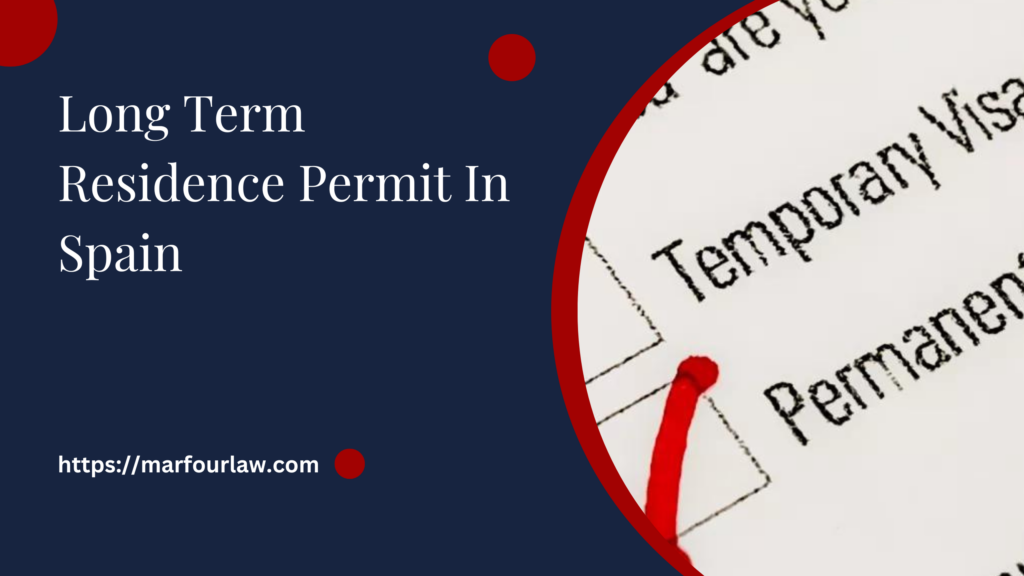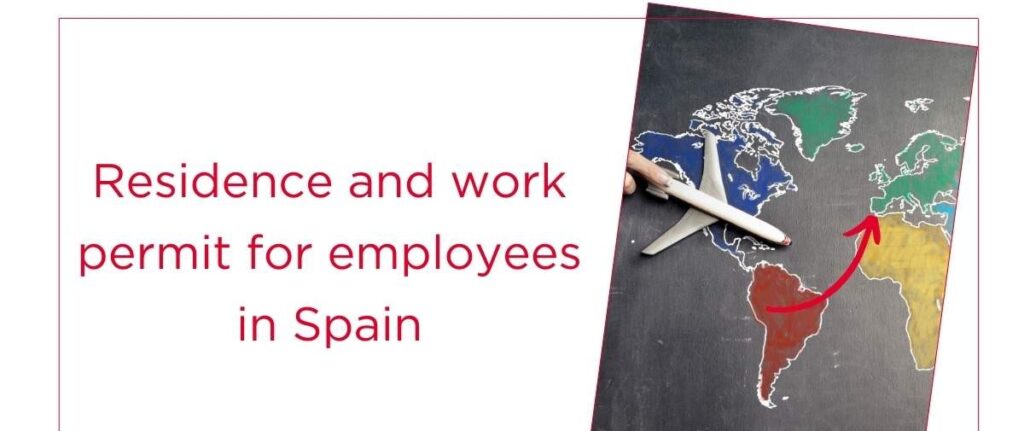Long Term Residence Permit In Spain
Our English-speaking immigration lawyers in Spain have many years of experience dealing with Long Term Residence permits in Spain. There are two types of long term residency permits: one specifically for Spain, and the other for long-term residency in the EU.

Building a Future in Spain: Your Guide to Permanent Residency
Do you want to stay in Spain long and not worry about paperwork? You can! If you have been living in Spain for a while, you might be eligible for permanent residency.
This special status has many benefits, such as the ability to skip renewing permits or skip coping with Spanish requirements permanently. However, all the terms can also be confusing.
Don’t worry! This article will clarify things. What exactly is permanent residency? What do you need to get it? And do all the years you’ve been in Spain count the same?
Keep reading to get all the answers…
What does Permanent Residency mean for You?
Permanent residency in Spain is a legal status that allows you as a foreigner to live, work, and study in Spain indefinitely.
It provides a pathway for you to really settle in the country, offering similar rights as Spanish citizens ones, except the right to vote in national elections.
You must legally reside in Spain for five years to qualify for permanent residency.
This period can include various types of legal residence, such as work permits, student visas, or family reunification visas.
Once the five-year requirement is met, you can apply for permanent residency, granting you the right to reside in Spain indefinitely without needing further visas or permits.
As a permanent residency holder in Spain, you can enjoy access to public healthcare, education, and social services. You can also travel freely within the Schengen Area, which includes most European Union countries.
This status provides:
- A level of stability and security.
- Allowing you to remain in Spain even if your original reason to settle was work or family.
It is important to note that the requirements and application process for permanent residency may vary based on your circumstances and any changes in Spanish immigration laws.
Visa Options Leading to Permanent Residency in Spain in 2024
Spain provides several visa options designed for those seeking permanent residency there. These visas serve as pathways for non-EU citizens to obtain temporary residence, ultimately leading to permanent residency.
Here’s a closer look at the main types of visas leading to permanent residency in Spain:
Employment Visas:
- Ideal for you with job offers in Spain, this visa category offers a secure path to permanent residency.
- It allows you to work and live in Spain, and after meeting certain requirements, you can apply for permanent residency.
Student Visas:
- You can apply for this visa as an international student pursuing higher education in Spain.
- While initially temporary, it can lead to permanent residency if you complete your studies and meet other residency criteria.
Non-Lucrative Visas:
- These are suitable if you want to retire or live in Spain without engaging in work activities.
- To qualify, you must demonstrate sufficient financial means to support yourself and your family. This visa can eventually lead to permanent residency.
Investment Visas:
- Designed for investors, entrepreneurs, and high-net-worth individuals, this visa allows you to invest in Spain’s economy.
- You can obtain temporary residence by making a significant financial contribution, which may lead to permanent residency.
For personalized guidance on selecting the right visa and in the application process, our team of immigration lawyers in Spain at Marfour Law Firm is available to assist you.
Obtaining Spanish Residency Through Studies and Employment

Securing residency in Spain is commonly achieved through employment, a pathway opened to EU citizens and non-EU residents. The process is generally smoother for citizens of other EU countries, with no specific procedures to navigate.
In 2024, as a foreign national from a non-EU country, you can apply for residency in Spain by studying or working, which is particularly appealing for young individuals. Study visas can be obtained for the duration of the enrolled courses, typically for short stays (3-6 months) or long ones (from 6 months or more).
The visa can be renewed before expiration if you continue your studies within the same educational institution. Renewal can be completed directly in Spain, eliminating the need to leave the country. Moreover, if you plan to stay in Spain for over nine months, you can obtain the TIE (Tarjeta de Identidad del extranjero, foreigner’s identity card).
If you are a non-EU citizen seeking employment in Spain, an employment contract must be signed before entry. Various types of work visas are available, including seasonal work visas, au pair work permits, long-term work/residence permits, and the EU Blue Card.
To obtain a work visa as a foreign national, the job must require specialized skills that are difficult to find, and you must undergo specific procedures to hire a migrant from a non-EU country. Meeting various requirements is crucial for securing residency in Spain based on employment.
Our team of immigration lawyers at Marfour Law Firm in Spain is skilled at providing comprehensive details on the requirements associated with obtaining a work visa.
If you are considering applying for a residence permit in Spain, we can address all your inquiries.
The Journey to Spanish Residency through Using a Business Visa
If you are aiming to become self-employed or establish businesses in Spain, you can take advantage of specialized visas designed for immigration to the country.
For those opting for self-employment, demonstrating sufficient financial stability is crucial, ensuring they can support their expenses.
On the other hand, if you are seeking business visas, you must create and register companies in Spain.
This route lets you secure Spanish residency by becoming shareholders or employees within your established businesses.
However, the most direct path to immigrating to Spain through a business visa is often via the Golden Visa Scheme.
Our team of immigration lawyers possesses the expertise needed to guide individuals from abroad who are eager to relocate to Spain and launch their businesses.
The process of obtaining a residence permit in Spain is streamlined, provided all legal requirements are diligently met. We are here to offer comprehensive assistance throughout the entire process.
The EU Blue Card in Spain: Your Path to Skilled Residency
Residing in Spain offers a remarkable opportunity to obtain the EU Blue Card. Here are the specific qualifications to meet to get this card:
- Possess tertiary education degrees and demonstrate specialized skills in your profession.
- Gather at least five years of professional experience in your field of expertise.
- Secure a work contract with a salary at least 50% higher than Spain’s average wage (or 20% higher, meeting specific criteria).
The EU Blue Card initially grants a one-year validity and is renewable. Our legal team stands ready to provide comprehensive guidance on obtaining the EU Blue Card in Spain.
Whether you are a skilled professional seeking residency or an employer aiming to hire top talent, we support you.
Investment-Based Permanent Residency in Spain in 2024
If you are a foreign entrepreneur or individual with substantial assets looking to immigrate to Spain, specific programs are offering permanent residency.
- The main options include the Golden Visa Scheme and the Wealth Visa Program.
- Under the Golden Visa Scheme, you from non-EU countries must meet at least one of the following criteria:
- Make a minimum capital investment of 2 million euros in government-approved bonds.
- Invest 1 million euros in shares of Spanish businesses approved by the Government.
- Opt for real estate investment, with a minimum property value of 500,000 euros.
- If choosing real estate, the property must be purchased 90 days before the golden visa application.The Golden Visa Scheme is known for its speed in granting permanent residency.
However, besides the investment, you as an applicant must fulfill other conditions, such as having a clean criminal record, obtaining medical insurance, and demonstrating the ability to support your way of life indefinitely.
- An advantage of this scheme is that you can relocate to Spain with immediate family members.
- The Wealth Visa Program offers an alternative path to Spanish permanent residency with fewer requirements.
- Applicants need a monthly income of 2,800 euros. Family members can also join the applicant in Spain, with an additional 700 euros per month secured for each dependent.
Our team of immigration lawyers in Spain is available to assist with preparing the necessary documents for residence by investment applications.
Applying for Spanish Permanent Residency: Step-by-Step
Applying for Spanish permanent residency allows you to reside in Spain forever without additional requirements. However, it’s essential to note that this process differs from obtaining citizenship, which involves a separate procedure. If citizenship is your goal, our immigration lawyers in Spain can assist. Below are the key conditions for obtaining permanent residency:

Reside in Spain for Five Years:
Living in the country for at least five years is a fundamental requirement for residency, and this duration must be supported with appropriate documentation. For many individuals, especially those immigrating from the USA, this requirement is straightforward due to their plans for extended stays.
Similar conditions apply in other European countries like Italy, where permanent residency is granted after this timeframe.
Submission of Application:
- You must complete and apply to the Foreigner’s Office if all conditions are met.
- Acquiring permanent residency is a crucial step for those considering immigration to Spain.
- In many cases, individuals already fulfill these requirements, especially upon securing employment (ensuring a steady income) and obtaining private healthcare coverage.
- Residency permits in Spain are available for EU and non-EU citizens, offering a pathway to long-term residence in this vibrant country.
Essential Documents to Apply for Permament Residency in Spain
Details of Current Living Status:
- If employed, provide a copy of your current employment contract.
- Documentation showing your self-employment status, such as business registration or tax documents.
- Proof of enrollment in an educational institution.
- Confirmation of retirement status or pension documentation.
Registration Certificate:
A registration certificate issued by the local police office in the city where you reside in Spain. This certifies your legal residence in the country.
Documentation of Residential Address:
Please provide recent utility bills (electricity, water, gas) showing your name and address in Spain and a copy of a valid rental agreement for your residence in Spain.
Proof of Financial Means:
- Recent pay slips or income statements from your employer.
- Showing regular deposits and financial stability.
- Investments, property ownership, or any other relevant financial assets.
Health Insurance:
Documentation proving that you have private or public health insurance coverage in Spain.
Criminal Record Certificate:
A certificate attesting a clean criminal record may be required, depending on the type of residency application.
Application Form:
Fill out the application form for permanent residency, providing accurate and complete information.
Additional Supporting Documents:
Any other documents specific to your situation or requested by the immigration authorities.
How to apply for permanent residence in Spain?
Here is a general explanation: You need to examine the eligibility requirements.

1. Examine the requirements for eligibility.
- You must have legally resided in Spain for five continuous years.
- You should not have spent more than 10 months outside Spain in a year during this period.
- You must demonstrate stable and regular income to support yourself and any dependents.
- You need to have public healthcare coverage in Spain.
2. Gather Required Documents:
- Application Form: Fill out the application form for permanent residency (Modelo EX-10 or EX-11).
- Your passport with the current visa.
- Copies of your residence permits or registration certificates.
- Recent pay slips, employment contracts, or pension or other income proof.
- Proof of public or private health insurance.
- Criminal Record Certificate from your home country and Spain.
- A certificate from your local town hall confirming your address.
- Rental contract or property ownership documents.
3. Application Process:
- After gathering all required documents and their copies.
- Fill out the application form completely and accurately.
- Submit your application at the Immigration Office (Oficina de Extranjería) or a designated office in your region.
- Pay the required fees.
4. Wait for processing
- After submission, your application will be reviewed by the authorities.
- It can take several months for the application to be processed.
5. Receive notification
- Once your application is approved, you will receive a notification.
- You will then be required to visit the Immigration Office to provide biometric data (fingerprints, photo).
6. Final Steps:
- Upon completing the process, you will receive your Permanent Residence Card (Tarjeta de Residencia de Larga Duración).
- This card is typically valid for 5 years and can be renewed.
Steps to Obtain Spanish Citizenship

1. Establish legal residence in Spain through work, study, family ties, or other legal means.
Ensure you meet the required residency period based on your circumstances.
2. Language and Culture Tests:
- Prepare for and pass the DELE A2 level or higher for Spanish language proficiency.
- Pass the CCSE exam to test your knowledge of Spanish culture and society.
3. Gather Required Documents:
- Passport and copies
- Birth certificate
- Marriage certificate (if applicable)
- Criminal record certificates
- Proof of residence in Spain
- Certificates of Spanish language and culture exam
- Proof of financial stability
4. Submit Citizenship Application:
- Complete the citizenship application form.
- Submit all required documents to the Civil Registry (Registro Civil) or relevant authorities in Spain.
Receive Spanish Citizenship:
- Once you have taken the oath, you will receive a certificate of Spanish citizenship.
- You can then apply for a Spanish passport.
Dual Citizenship Considerations:
As mentioned earlier, Spain generally does not permit dual citizenship for citizens of non-Ibero-American countries, including the Philippines.
Therefore, you may be required to renounce your Filipino citizenship unless specific exceptions or agreements exist.
Spanish Residency Process for EU Nationals
Since 2007, EU citizens have no longer been required to possess an EU Residence Card, as it has been substituted with the residence certificate for stays exceeding six months in Spain.
Nonetheless, if you hold an existing EU residence card, you are not mandated to re-register until its expiry. According to Spanish legislation, EU citizens must register at a Foreigners’ Office within three months of their arrival to be listed in the Central Register of Foreign Nationals.
The residence certificate provides essential details, including name, address, tax identification number (NIE), and nationality. A re-application is necessary if any changes occur in the certificate’s information, such as marital status changes.
In 2024, our team of immigration lawyers in Spain is fully equipped to assist you throughout the residency certificate registration process and other immigration-related matters. You can trust our team for comprehensive support and expertise.
What Needs to Obtain a Spanish Residency Card
If you are a foreign citizen who has moved to Spain, you can apply for your residency card. To do so, you need to:
- Obtain your NIE number (or foreign tax identification number).
- Have valid health insurance.
- Pay the issuance fee for the residency card.
You must provide evidence of the above requirements, along with the completed application form for the residency card, proof of income (meeting a minimum requirement for self-sustenance), and two passport-sized photos. The process of obtaining the residence card typically takes a few days.
Our legal team is available to assist you with matters beyond immigration procedures.
We also offer housing and insurance services for foreign citizens relocating to different cities in Spain. Feel free to contact us for guidance on applying for a residence permit in Spain.
Comparing Spanish Residency and Citizenship: What Sets Them Apart
As our Spanish immigration advisors discussed earlier, residency and citizenship are different matters for expatriates residing in Spain. With long-term permanent residence in Spain, you can maintain your original nationality and passport from your home country.
However, citizenship means leaving your original nationality and the corresponding passport.
In 2024, those seeking residency in Spain must meet the same criteria as in previous years. They can choose either employment or starting a business for their relocation. If you have any questions about obtaining residency in Spain in 2024, please contact our legal team.
Citizenship in Spain refers to the legal status enjoyed by Spanish citizens and qualifying foreigners. This status includes various rights, such as voting rights and access to the entire labor market. If you are interested in determining your eligibility for a Spanish passport, please contact us.
Additionally, the immigration offices in Madrid have introduced a new method to schedule appointments to submit residence permit applications. This streamlined process includes appointment scheduling, which was previously limited. The initial step involves identifying the documents required for your procedure and scanning them in PDF format. You must then submit your appointment request via email.
Visa Processing Durations for Different Types in 2024
Each visa type and residency option in Spain has its unique processing timeline. While there are general guidelines, these durations are approximate and vary significantly based on individual circumstances. Obtaining a non-lucrative residence visa is generally straightforward, with an average processing period of 30 days once the required documentation and proof of funding are submitted.
Investor visas typically undergo approval within about 20 days after the necessary paperwork and financial commitments are provided. Upon approval, there is a one-month window to apply for a ‘golden visa’ at your local Spanish consulate, allowing you to visit Spain and resubmit the application. In total, this entire process usually takes approximately 50 days.
For further details on obtaining residency in Spain, we encourage you to contact our Spanish immigration experts for personalized assistance. Additionally, we can assist with applications for a Spanish Nomad Visa.
If you are considering remote work from Spain, rely on us for program details and requirements. Please don’t hesitate to email us with any inquiries about the specific conditions for temporary relocation to Spain.
FAQs
Here are some important FAQs:
What is the difference between permanent residency and citizenship in Spain?
Permanent residency allows individuals to live indefinitely in Spain, similar to Spanish citizens, but without the right to vote. On the other hand, citizenship grants full rights, including voting and access to the entire labor market.
How long must I live in Spain to qualify for permanent residency?
Individuals must live in Spain for five years to qualify for permanent residency. This period may vary for certain circumstances, such as marriage to a Spanish citizen.
What are the financial requirements for permanent residency in Spain?
There are no specific financial requirements for permanent residency, but applicants must demonstrate they can support themselves financially.
Can I work in Spain with permanent residency?
Yes, permanent residency holders in Spain can work without any restrictions.
Do I need to speak Spanish to apply for permanent residency?
Knowledge of Spanish is not an official requirement for permanent residency, but it may benefit integration and daily life.
Conclusion
Hence, obtaining permanent residency in Spain allows individuals to live forever in this vibrant and culturally rich country.
With rights similar to those of Spanish citizens, such as the ability to work without restrictions and access to healthcare and education, permanent residency provides a stable and secure foundation for life in Spain. While the process may vary based on individual circumstances, the general requirements include demonstrating the ability to support oneself financially, providing necessary documents, and residing in Spain continuously, typically for five years.
It will open doors of opportunities for you right in the Spain.
The long-term residency permit is a permanent Spanish residency and work authorization that allows the holder to live in Spain indefinitely with the same conditions as a Spanish citizen.
In most cases, the applicant can obtain a Spanish residency permit after legally living in Spain for more than five years (continuously). However, there are several situations in which the applicant can get this type of residency permit without having lived in Spain for five years, as can be seen below.
obtained Long Term Residency Permits
assisted Clients
%
satisfied clients
What are the main requirements for the long term residency permit?
- Must be a non-EU citizen.
- Must not be in the country illegally.
- Must not spend more than 6 months continuously outside of the country per year, with a limit of 10 months absence during the five years. 12 months is permitted for labour reasons.
As mentioned above, you can apply for the long-term residency permit in Spain if you meet one of the following criteria:
- You are a resident who is receiving a pension.
- You are a resident receiving a pension for a permanent disability.
- You were born in Spain, are over the age of 18, and have spent at least 3 years living in the country.
- You were previously a Spanish national but have since lost your nationality.
- You are a stateless person, a refugee, or a beneficiary of subsidiary protection.
- You have contributed in a significant way to the economic, scientific, or cultural progress of Spain, or promoted Spain’s reputation abroad.
How can I apply for the long term residency permit in Spain?
The administration has up to 3 months to issue a resolution.
The Spanish long term residency permit is valid for 5 years.
HOW CAN I RENEW MY LONG TERM RESIDENCY PERMIT?
If your long-term residency permit expires soon, please note that you can proceed with the submission of the renewal 60 days before the expiration date and up to 90 days after.
Our immigration lawyers in Spain will prepare the necessary information and documents for your application.
CAN THE SPANISH GOVERNMENT CANCEL MY LONG TERM RESIDENCY PERMIT?
- The authorization / permit was obtained fraudulently.
- A court expulsion order has been issued against you.
- You have been absent from EU territory for 12 consecutive months.
- You have been granted long-term residency in another EU member state.
However, there is a process that can recover your Spanish long term residency permit.
Do not hesitate to contact us for more information.

testimonials
![]()
![]()
MARFOUR IS READY TO HELP YOU WITH YOUR LONG TERM RESIDENCY PERMIT

